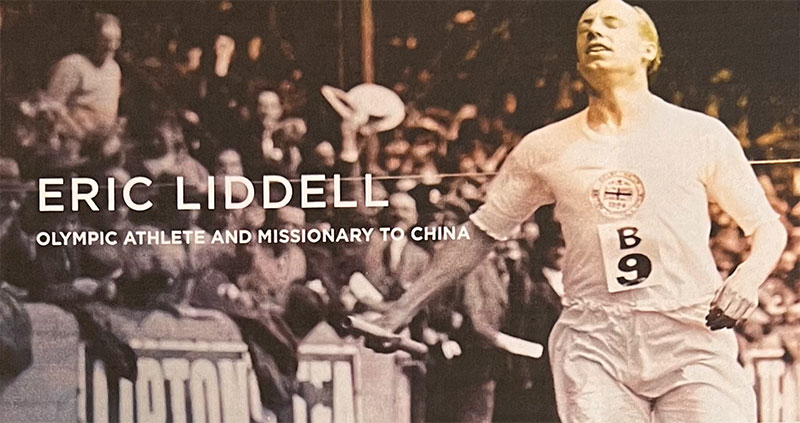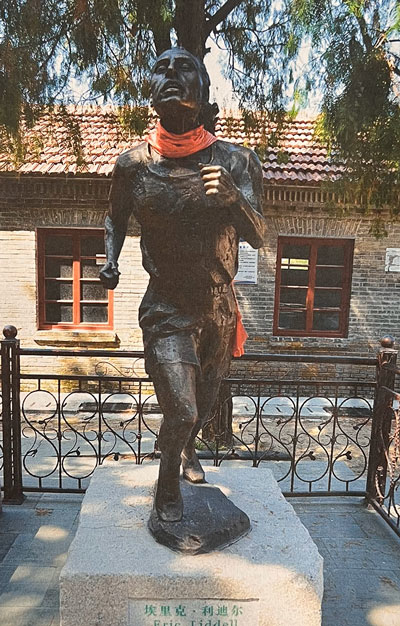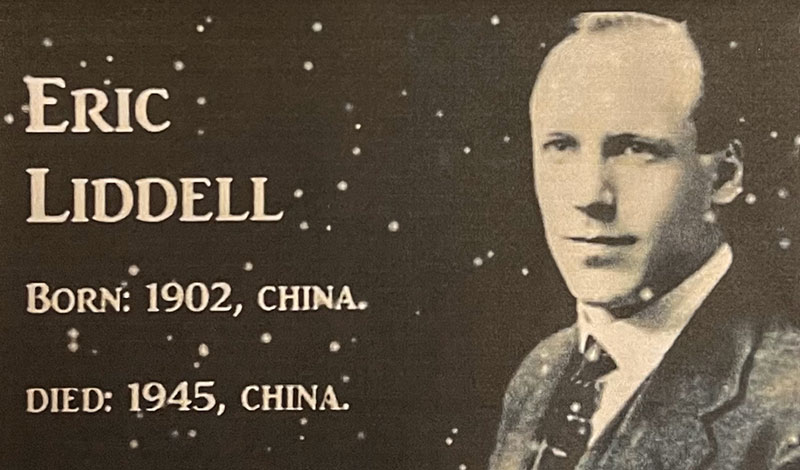“They shall mount up with wings as eagles; they shall run and not be weary” - Isaiah 40:31

Some people seem “born to run”. I was never one of that number, but some men and women make it look easy; their Creator apparently blessed them with “swift genes” and invisible “wings” on their feet. One of these people who loved to run was a Scotsman named Eric Henry Liddell (1902-1945). God blessed Eric with a love for running that I never had, to such an extent that during his university days he was considered the fastest runner in Scotland. He was awarded a Gold Medal in the 1924 Paris Olympics for winning the “400 Meter” race, an event in which he had been given almost no chance ofmedaling, for his true specialty was the “100 Meter” race, from which Liddell had previously withdrawn. Why would a world-class runner withdraw from an event that he was favored to win? Therein lies the story of this special man, the future missionary who seemed to have “wings on his feet”, but who left the world of sports to serve his LORD and Savior in China.
Back in 1981, an award winning film called Chariots of Fire was released. I was impressed with its message, which centered around the concept that, for Christians, obedience to God’s Word is more important than seeking after worldly acclaim, with the admonition for Christians to seek God’s power through the message from a part of 1st Samuel 2:30: “…Those who honor Me I will honor…” That film wasn’t entirely historically accurate, but it was sufficiently so, as it depicted Eric Liddell’s intense training for the 1924 Olympic Games, his unusual running style, some of his prior races, and especially the religious convictions that influenced his life on the track and, later, in his service as God’s missionary in China.
Liddell was born in Tientsin, China in 1902, and died in a Japanese internment camp in occupied China in 1945. In fact, China used to claim that Liddell was the first Chinese man to ever win an Olympic Gold Medal. Eric’s parents, Rev. and Mrs. James Liddell, were Scottish missionaries with the London Missionary Society. Eric was schooled in China with other missionary kids until he was six. Then he and his eight-year-old brother, Robert, were enrolled in a boarding school in London that was run for the sons of missionaries. His parents, sister, and new brother returned to China, and Eric saw them only a few times as he was growing up when they all came home to Edinburgh on furloughs.
Eric Liddell was a simple man who lived a sort of complicated life. He devoted much of his all-too-short life to helping the Chinese people, trying to make their lives and their world better. Try to imagine what it must have been like for Liddell who, after he died in a Japanese internment camp in occupied China in February, 1945, was remembered mostly for the fact that once upon a time (in 1924) he ran faster than anyone else in a race. As I’ve researched this amazing Christian’s life, I’ve concluded that basking in the “glory” of an Olympic Gold Medal was the farthest thing from his mind.
During Eric’s pre-university life at his boarding school, Eltham College, he became an excellent athlete, and eventually became captain of both the cricket and the rugby teams there, but the headmaster of Eltham described him as “entirely without vanity”. He was a good athlete, and was especially good at running. Later, as a student at the University of Edinburgh, Eric became known countrywide as ‘the fastest runner in Scotland’. Soon Scottish newspapers were forecasting that Liddell was a future Olympic medalist. Eventually, after years of grueling training, Eric qualified for the Scottish Olympic team for the 1924 Games, hosted by Paris, France.

Although most Americans didn’t know who Eric Liddell was before seeing Chariots of Fire, (and most still don’t), right before those Olympic games he was the subject of great European interest, and more than a little “scorn”, which made him “infamous” in the eyes of some of his countrymen. You see, the event for which Liddell was supremely qualified, and in which he certainly would have won the Gold Medal, was the 100 Meter Race. But for a devout Christian like Eric, it was a matter of conscience, for his strong event, the 100 Meter race, was scheduled to take place on Sunday, the Sabbath. This schedule was known long in advance of the games (a fact not disclosed in the film), and Liddell absolutely refused to run in any Olympic event held on the Sabbath.
Since Eric knew well in advance of the Games that he could not and would not run on the Sabbath, he began to train vigorously for the 400 Meter Race, not one of his strong races, and for which he was harassed for months in advance of the Games because of his decision to not run on the Sabbath. He was even brought before the British Olympic Committee and grilled over his decision, because everyone knew that Eric had the best chance of winning the 100 Meter Race, which would bring “glory” on Scotland. However, he remained steadfast in his refusal to run on Sunday.
On the morning of July 11, 1924, Eric was given a folded piece of paper, a message from one of the Scottish team’s masseurs (NOT from an American competitor, as the film portrayed). The message was direct and encouraging: “In the old book it says: ‘He that honors me I will honor’. Wishing you the best of success always.” As the starting gun sounded, the “wings on his feet”, with which he had been blessed, came through for him as Liddell defied all the odds and WON the Gold Medal in the event, setting a world record of 47.6 seconds, which stood until it was beaten by another runner from Britain in the 1936 Berlin Olympics. Eric was later asked why he ran the 400 Meter Race as a sprint, running his heart out the entire distance. His reply was: “I run the first 200m. as hard as I can; for the second 200m., with God’s help, I run harder.”
A year after his dramatic Olympic victory, Eric returned to China, the land of his birth, to begin serving his Savior as a teacher/missionary, just as his parents before him were serving. For several years he served as a science and sports teacher in a college in Tientsin, the city of his birth. However, his true passion was in his work as a Christian missionary, working mostly with the children of influential and wealthy Chinese, with the expectation that they would became influential Christians in the future. Eric returned to Scotland for a furlough in 1932 and was ordained as a minister. Upon returning to China in 1934 he met and married Florence Mackenzie, whose parents were Canadian missionaries in Tientsin.
By 1941 life in occupied China (roughly the south-eastern half of that country) became very dangerous due to Japanese aggression and the atrocities committed by the Japanese military against the Chinese population. Eric sent his pregnant wife, Florence, and his two daughters back to Canada for safety, but he stayed behind and took a position at a rural mission station in Xiaozhang, which served the poor. Eventually the Japanese army overran the mission station, and Eric returned to Tientsin in March, 1943. Liddell was eventually rounded up by the Japanese military, along with other missionaries and other westerners, and was interned at the Weihsien Internment Camp near the modern city of Weifang, China. (This was during the time that Christian missionary Capt. John Birch was also ministering to the Chinese people as well as serving as an Intelligence Officer in the U.S. Army Air Force in China).

Doing his best to maintain his Christian testimony under very difficult conditions, Liddell was beloved by all who survived the internment. In his last letter to his wife, written on the day he passed into Glory, Eric told her of his having suffered a “nervous breakdown due to overwork”. According to a fellow missionary in the camp, Liddell’s last words were: “It’s complete surrender”, describing, I think, how he had given over his life to God. An autopsy after his death showed that he had an inoperable brain tumor, but without doubt overwork and malnourishment hastened his passing. Eric Liddell, God’s “Gold Medalist”, died on Feb. 21, 1945, just five months before China’s liberation from the brutal Japanese occupation. But his dedication to serving his Savior lived on in changed lives among the people of China and Scotland. His dedication to excellence as a Christian missionary and as an Olympic athlete has inspired countless others who came after him to do likewise. His love for God’s Word and his devotion to serving his Savior, Jesus, under often difficult and brutal conditions, should inspire us to do likewise.
+END NOTES: “Eric Liddell’s Daughter Seeks Her Father Through Faith”.
“The daughter of Scottish Olympic gold medalist and missionary Eric Liddell has written a book seeking to know the father she never met through the faith that drove him.
“Eric Liddell is most famous as the athlete who refused to run on a Sunday but went on to win the Olympics 400m, inspiring the film Chariots of Fire. However, he spent most of his adult life working as a missionary in China.
“Maureen Liddell Moore, his third child, was three years old and living in Canada when her father died in a Japanese internment camp in China in 1945. Maureen’s mother (Florence), had been pregnant with her when she fled the Japanese invasion with their two other children.
“As Maureen never met her father, she decided to turn to faith and God in what she calls her “search for her father’s love”. God and Me is a book of prose, poetry and art which Maureen used to become closer to her father.
“Maureen said: ‘I knew early on that if I wanted to understand my father I would also have to get to know the God my father loved so well. This search led me on an unorthodox and surprising journey that turned my world upside down. I first fell in love with God when I discovered he has a huge sense of humour and I found myself totally surprised, in awe and laughing with relief.’”
+Taken from a review of “God and Me”, written by Maureen Liddell Moore (available on AMAZON), published in “Life and Work—The Magazine of the Church of Scotland”, Oct. 13, 2017 (Author’s name unattributed).













